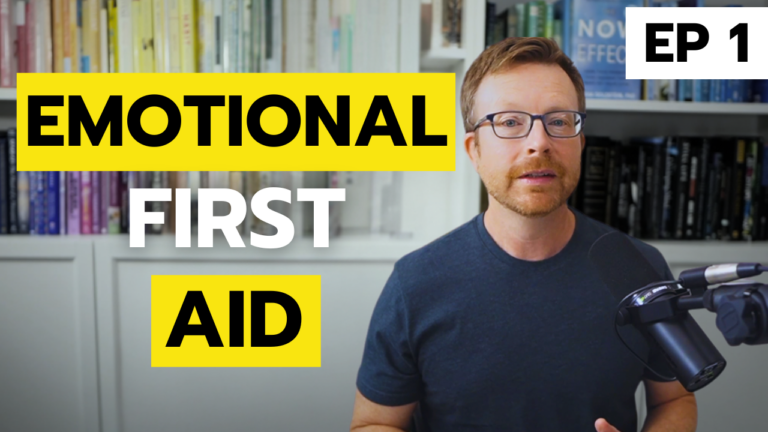
Personal Growth
“Each time we choose to care for our mental health, we’re building our emotional resilience—and with resilience, we’re more equipped to handle the challenges life throws our way.” – Elisha Goldstein

Founder and Psychologist
by Dr. Elisha Goldstein
We discuss:
00:00 – The Birth of Emotional First Aid
02:51 – Understanding Emotional Hygiene
06:07 – The Impact of Loneliness on Health
08:53 – Building Emotional Hygiene Practices
11:46 – Self-Compassion as Emotional First Aid
15:07 – Breaking the Cycle of Rumination
17:55 – The Connection Between Emotional and Physical Health
20:46 – Building Resilience Through Emotional Hygiene
24:01 – Transforming Emotional Health in Society
I’m excited to share the first episode of my new podcast, Emotional Longevity, where we dive into the essential yet often overlooked concept of emotional first aid. This is a practice I’ve explored throughout my career, and I’ve seen firsthand how crucial it is to take care of our emotional health just as we do with our physical health. With the modern pace of life and with so much going on in the world today, this seems to be more relevant than ever. Today, let’s talk about how emotional hygiene—tending to our emotional wounds—can have a profound impact on our overall well-being and longevity.
The Importance of Emotional Hygiene
Growing up, many of us were taught how to prioritize our physical health—brushing our teeth daily to prevent cavities, using band-aids for cuts, and taking medicine when we’re sick. These practices became automatic, part of our routine. Yet, how often were we taught to care for our emotional well-being in the same way? The concept of emotional hygiene—that is, the practice of caring for our emotional health—didn’t hit home for me until later in life.
From a young age, we’re taught to care for our bodies, but we rarely talk about how to care for our emotions. When something physical happens, like scraping our knee, we instinctively reach for a band-aid. But what happens when we face emotional pain, such as a tough rejection or a failure? There’s no natural impulse to tend to our emotional wound. We often don’t have the tools to deal with it.
Why Don’t We Teach Emotional Hygiene?
Imagine if, alongside brushing our teeth, we were taught to handle feelings of rejection, disappointment, or self-doubt. It would change the way we navigate life’s ups and downs. While some schools now incorporate social and emotional learning, for most of us, this wasn’t part of our upbringing. In the corporate world, emotional intelligence is starting to gain traction, but it’s not prioritized nearly as much as it should be.
This gap is significant because emotional injuries—like rejection, failure, or loneliness—are often dismissed or overlooked. When someone breaks their leg, we care for it. We don’t tell them to “just walk it off.” But when someone feels emotionally broken, we often hear the words, “just get over it,” which invalidates their pain. Emotional wounds deserve the same level of care as physical ones.
Emotional Health and Its Physical Impact
Let’s dive into psychological injuries, particularly loneliness, which Mother Teresa once described as “the greatest epidemic.” In our culture today, loneliness is more prevalent than ever. Whether it’s from a disconnection in a personal relationship, within a family, or a sense of isolation from society, loneliness creates a filter through which we view the world, amplifying insecurities and even misinterpreting others’ actions.
This emotional loop—where negative thoughts, feelings, and actions feed into each other—can make the pain of loneliness worse. We start to isolate ourselves, which only deepens our feelings of being alone. What’s even more concerning is the physical toll that emotional pain can take on our bodies. Studies have shown that chronic loneliness increases the risk of early death by 14%, comparable to smoking. The stress caused by emotional pain puts pressure on our organs, raises blood pressure, and may lead us to unhealthy coping mechanisms, like overeating. It’s all interconnected.
Practicing Emotional First Aid
So, what can we do when faced with emotional pain? Let’s talk about emotional first aid. The first step is recognizing when we’re suffering. Just as we would treat a physical injury with care, we must also recognize and tend to our emotional wounds. Self-compassion is a cornerstone of this practice. When you face failure or rejection, treat yourself with the same kindness you would offer a close friend. This is the foundation of emotional first aid—acknowledging our suffering and giving ourselves the support we need.
Breaking the cycle of rumination is another key aspect. When negative thoughts loop in your mind, they can feel endless. One way to break this cycle is through small distractions, like going for a walk or reaching out to a friend. Engaging in positive practices, like appreciative awareness, can also help shift your perspective. For example, when feeling overwhelmed, ask yourself, “What might be supportive in this moment?” It’s about learning how to support yourself before jumping to solutions.
Building Emotional Resilience
The more we practice emotional hygiene, the more we build resilience. Just as we build physical strength through consistent exercise, we can strengthen our emotional resilience through intentional practice and repetition. One powerful way to do this is through mindfulness. I’ve experienced firsthand how mindfulness can reduce rumination and help us stay present with our emotions, rather than letting them spiral into anxiety or depression.
For example, when I struggled with panic attacks and insomnia, mindfulness became my tool to regain control. I learned that the more I was present with my emotional experiences, the more I could dial down the cycle of anxiety. This wasn’t easy, but by acknowledging and accepting my emotions without judgment, I gradually began to feel more grounded and less controlled by fear.
Emotional Hygiene as Part of Your Daily Routine
Emotional hygiene isn’t just about managing emotional pain when it arises—it’s about making it a regular part of our lives. Just like we make time for exercise, sleep, and nutrition, we must create habits that support our mental health. By practicing emotional first aid, we’re building the emotional resilience needed to handle life’s challenges with grace and strength.
Imagine if we all prioritized our emotional health in the same way we prioritize our physical health. The impact on our lives—on our families, relationships, and communities—could be transformative. When we take care of our emotional well-being, we’re not only supporting our present selves but also ensuring a longer, healthier, and more joyful life.
Take Action Today
As you reflect on your emotional health, think about one area that could use attention today. What might you need to support yourself through a challenging moment? It could be as simple as naming the feeling you’re experiencing, offering yourself some self-compassion, or taking a moment to engage in a mindfulness practice.
If you enjoyed this and found it useful, I’d love for you consider one other person that this could be supportive to and send it onto them. The could listen to the Emotional Longevity podcast or read this blog.
If you enjoyed this content and are ready to take your emotional health to the next level, I invite you to explore my Emotional Health Coaching Program, Uncover the Power Within,. This program offers practical tools, evidence-based strategies, and a caring community to support you on your journey to emotional resilience.
Subscribe here to be the first to learn when the next episode of the Emotional Longevity Podcast releases, and for more insights on emotional resilience and well-being. Take care of yourself, inside and out.